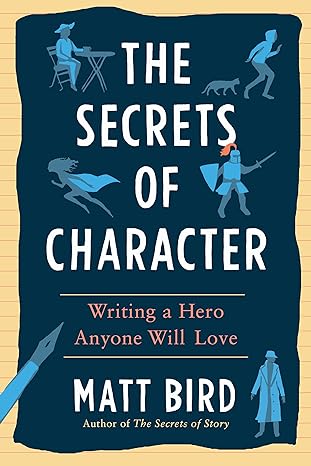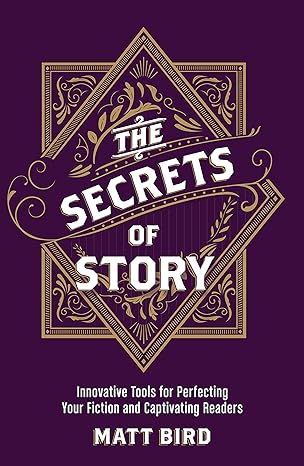I’ve stumbled upon a writing resource that needs to be shared on the Kill Zone. It’s called the Ultimate Story Checklist, and it’s on a website called Cockeyed Caravan hosted by Matt Bird. If the names aren’t familiar, Matt Bird is an A-List screenwriter who recently published a book titled The Secrets of Story.
While the website and book are aimed at the screenwriting market, there’s a lot of value here for regular storytellers. Matt Bird delivers many great takeaways, one being, “Audiences purchase your work because of its concept but embrace it because of the characters”. I put that quote on my daily affirmation board.
You can download the Ultimate Story Checklist here. However, I’ll list the highlights so you’ll get an idea where this craft book and blog are coming from. Here’s the CliffsNotes version of over 200 sub-points to check off:
Part 1: Concept
The Pitch — Does the concept excite everyone who hears it?
Story Fundamentals — Wil this concept generate a strong story?
The Hook — Will this be marketable and generate word of mouth?
Part 2: Character
Believe — Do we recognize the hero as a human being?
Care — Do we feel for the hero?
Invest — Can we trust the hero to tackle the challenge?

Part 3: Structure
1st Quarter — Is the challenge laid out in the first quarter?
2nd Quarter — Does the hero try the easy way in the second quarter?
3rd Quarter — Does the hero try the hard way in the third quarter?
4th Quarter — Does the challenge climax in the fourth quarter?
Part 4: Scenework
The Set-Up — Does this scene begin with the essential elements it needs?
The Conflict — Is this a compelling collision of competing agendas?
The Outcome — Does the scene change the story going forward?
Part 5: Dialogue
Empathetic — Is the dialogue true to human nature?
Specific — Is the dialogue specific to this world and each personality?
Heightened — Is the dialogue more pointed and dynamic than real talk?
Strategic — Are certain dialogue scenes withheld until necessary?
Part 6: Tone
Genre — Does the story tap into pre-established expectations?
Framing — Does the story set, reset, upset, and ultimately exceed its own expectations?
Part 7: Theme
Difficult — Is the meaning of the story derived from a fundamental moral dilemma?
Grounded — Do the stakes ring true to the world of the audience?
Subtle — Is the theme interwoven throughout so that it need not be discussed often?
Untidy — Is the dilemma ultimately unsolvable?
As mentioned, there are well over two hundred sub-questions in the parts and categories. I plugged my WIP netstream series City Of Danger into the Ultimate Story Checklist. It’s a well-worthwhile exercise that brings clarity and gives guidance.
Kill Zoners — Has anyone heard of this resource or of Matt Bird? Do you use any sort of checklist or guideline for your storytelling? Please share what works for you and any recommendations you have.


CS Lakin put out a fiction checklist here:
https://www.livewritethrive.com/wp-content/uploads/2011/12/fiction-critique-checklist.pdf
It covers areas such as: Conflict, Plot, Pacing, Tension, Setting/Locale, POV, Voice, Characters, Dialogue, and Overall impression,
Lakin also has a complete list of her personal resources, but if I give another link, my comment may be shunted to a secret room on the KZB site, never to be seen again.
I have a personal rewrite punchlist covering subjects such as Text, Theme/Setting/Motif, Dialogue, Story, Character, Structure, and Marketability. Same comment re multiple links on KZB. If you’d like a copy, leave a comment on my blog, JGuentherAuthorDOTwordpressDOTcom .
J, it’s nothing personal. A comment with multiple links causes Word Press to quarantine it for security reasons.
Of course. But does anyone ever check the quarantined files?
I can only speak for myself. That’s not a part of the site that I access often. Not being techie, I’m always afraid of screwing up something If I veer out of my regular lane of limited knowledge. 😉
I can’t speak for anyone else, but I have good intentions to always check for comments that have been quarantined. However, I rarely-to-never remember to do it. It would be valuable if WordPress would send an email to the contributor when a comment is sidelined.
I did not know that, Debbie. But then there’s a lot I don’t know about WordPress.
Thanks for the link, JGA. Small world – Susanne Lakin was scheduled for a guest post spot here today but she was on the road as a conference speaker. Look forward to her piece titled “The Importance of Crafting Connected Settings” here on TKZ in a couple weeks.
Garry, thanks for the intro to Matt Bird. Two items in the Scene checklist jumped out as esp. important:
“The Conflict — Is this a compelling collision of competing agendas?
The Outcome — Does the scene change the story going forward?”
Those elements keep the reader turning pages eager to know what happens next.
Hi Debbie! I guess the absolute, rock-bottomline of commercial storytelling is getting the reader to turn the page to buy your next book. If you ever find the magic formula, don’t tell anyone else than me. 🙂
I hopped over to Cockeyed Caravan and immediately got caught up in the post on The One Gut Punch Scene. I immediately bookmarked it. This is going to be a great resource.
I stumbled on Matt Bird’s book through my screenwriting ventures, Patricia. His site is a treasure trove of information. I’ll check out his Gut Punch post in a minute. Thanks for the suggestion!
Handy rundown of Matt Bird’s story checklist, Garry. Terrific points.
I have heard of Bird—in fact, I’ve bought both his books but have yet to get to reading them. Your post will change that 🙂
I almost always put together a “super structure” checklist, based on JSB’s Super Structure. I also look to see if my story has his golden triangle of pre-story, mirror moment and climax/resolution. Moreover, with mystery, I’m looking at the parallel arcs of the murderer’s story and the investigation plot, which turns out to follow Bird’s four quarters structure. Since I’m writing cozy mystery, the heroine’s “hard way” in the third quarter will wind up being something normally out of bounds (in the first book, this involved lock picking to break into a house—for very good reasons, but still)..
Good morning, Dale. Yes, JSB has a pile of great instructive material available and it’s entertaining reading as well. I just downloaded Matt Bird’s “Character” book and it’s moved right up on my TBR list. BTW, breaking into houses is quite illegal.
Thanks for the mentions, Dale and Garry.
You’re welcome, Jim. I’ve read most of your craft books and got a lot of good information/suggestions from them so thank you 🙂
Definitely quite illegal. There’s reasons, but still, it’s breaking the law. Ultimately, she gets away with it because the owner ended up being fine with her doing so.
Thanks Garry for the information on Matt Bird and the link to the Ultimate Story Checklist. Very helpful.
I had not heard of Matt Bird before. I use a checklist I created from Larry Brooks book, Great Stories Don’t Write Themselves. I keep it beside me while outlining and writing the rough draft. I’ll print out Matt Bird’s checklist and use it in the same way.
Thanks!
You’re quite welcome, Steve. I find this list puts the whole picture in perspective. And thanks for the nod to Larry Brooks. He’s another great resource and teacher. For those who don’t know of Larry, Story Engineering is a must-read.
Good morning, Garry. You’ve made my day — I love lists.
I had never heard of Matt Bird or his checklists, but I like the abridged version you made. (Except for Part 6 on Tone: “Does the story tap into pre-established expectations? Does the story set, reset, upset, and ultimately exceed its own expectations?” I don’t really understand what those questions mean. )
Thanks for the link. I hopped over to Matt’s site on Secrets of Story and it looks awesome. I’ll be spending some time there in the next weeks.
As for me, I have a simple map of the hero’s journey on a whiteboard by my desk, and I refer to it as I write. And I have shelves of craft books that I refer to as I draft my stories. But you’ve inspired me to make up my own list.
And good morning back. Kay. This list is very comprehensive when you dig into it. Some points were relative and some seemed remote like you mentioned. Like all reference material, I think it a smorg where you take what you need and leave the rest. Enjoy your day!
I heard of Matt Bird from you, Gary. I think you mentioned him in a comment a couple years ago and I picked up his book then. Fabulous insights, and it helped clarify a lot of stuff for me, particularly on character arc and inciting incidents.
His character book wasn’t as insightful for me, but then, I don’t find writing books to be very helpful in that area. Better to study acting for creating great characters.
I remember the post, Azali. It was when I first ventured into screenwriting and was shopping for resources. I like his style. I just downloaded his character book and looking forward to what he has to say.
I have these books, use them even though I’m a pantser, and enjoyed reading them. His writing style is engaging and he describes his points so well that they’re easy to understand. Any resource on writing helps me get the information in my mind so that when I’m writing, I subconsciously use it, and these are great.
I agree with you about Matt Bird’s communication style, Becky. He’s easy to read and understand.
Excellent checklist, Garry. Thanks for the intro to Matt Bird’s site. I’ll check it out as soon as I get over this dang flu… At the moment, it’s knocked me on my butt.
Sorry to hear you’re with the bug, Sue. Is it some sort of Covid strain?
No idea. It sure feels like it, but I haven’t been tested.